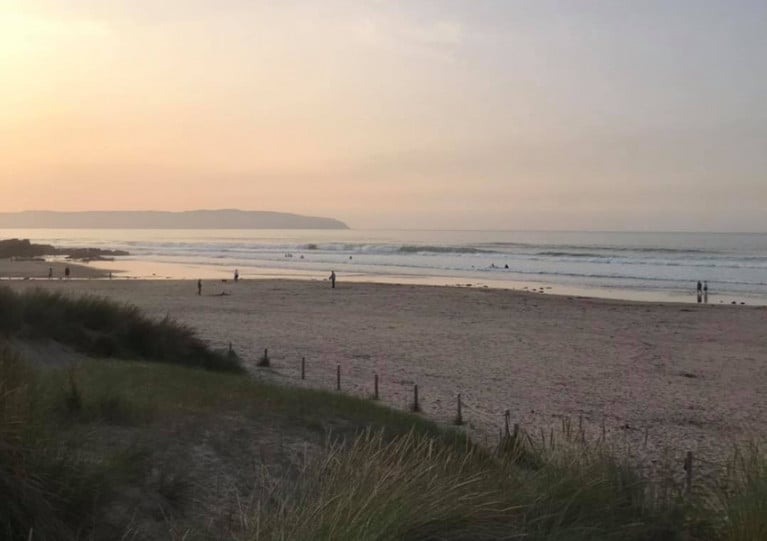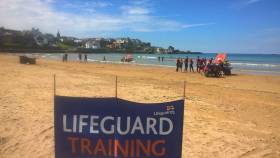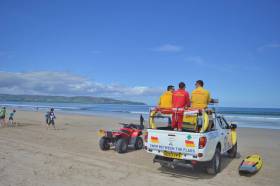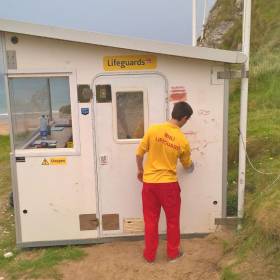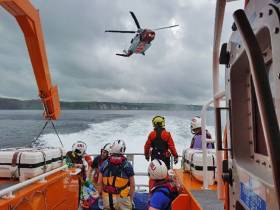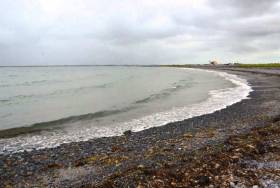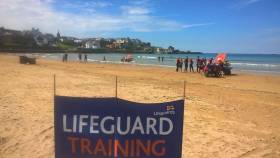Displaying items by tag: lifeguards
RNLI Lifeguards in Northern Ireland Rescue 3,701 People in a Decade of Patrolling Beaches
The RNLI in Northern Ireland has reached 10 years of delivering a world-class lifeguard service to coastal communities and their visitors along the Causeway Coast and in County Down. From this Saturday, 26 June, RNLI lifeguards will provide a full-time daily patrol on 11 beaches in what is anticipated to be one of the charity’s busiest seasons yet.
Since 2011, RNLI lifeguards have saved 48 lives in Northern Ireland. They have aided 3,701 people through water rescue, returning lost children and delivering first aid and casualty care. During that time, lifeguards have responded to 3,290 incidents and carried out over 1M preventative actions.
The RNLI introduced a lifeguard service on seven beaches along the Causeway Coast in 2011 at Downhill, Castlerock, Benone, Whiterocks, Portrush East, Portrush West and Portstewart. The service was extended to three beaches in County Down the following year at Cranfield, Tyrella and Murlough. And in 2017, RNLI lifeguards began a new patrol at Ballycastle.
 RNLI lifeguards will provide a full-time daily patrol on 11 beaches in what is anticipated to be one of the charity’s busiest seasons yet.
RNLI lifeguards will provide a full-time daily patrol on 11 beaches in what is anticipated to be one of the charity’s busiest seasons yet.
As lifeguards complete intense inductions ahead of the eleventh full-time summer season getting underway this weekend, Michael Thompson, RNLI Area Lifesaving Manager who himself is a former lifeguard and supervisor, paid tribute to the team: ‘Thanks to RNLI lifeguards our beaches are safer places, so we can enjoy our time at the coast and return home safely at the end of the day. Around 95% of a lifeguard’s work is in prevention. They keep beachgoers safe by educating them about water safety and spotting the dangers before accidents happen. RNLI lifeguards past and present have kept beach visitors safe over the past 10 years in Northern Ireland and will continue to do so for years to come. If you are planning a visit to the coast this summer, please remember to visit a lifeguarded beach.’
Karl O’Neill is a Lead Lifeguard Supervisor on the Causeway Coast and along with senior lifeguard Bosco McAuley, he was part of the first RNLI lifeguard team to patrol beaches in 2011. Karl is also a volunteer crew member at Portrush RNLI.
Reflecting on a decade of lifeguarding, Karl said: ‘The RNLI already had a strong history of providing a front-line emergency lifesaving service and were able to bring the knowledge and expertise over from the lifeboat service to the lifeguards. The equipment and the training from the RNLI really set the gold standard.
‘The fundamentals remain the same as when I started 10 years ago in that we still need to be highly trained, capable and skilled lifeguards on our beaches. But there has definitely been a shift with how we keep people safe. This has developed alongside the amount of people we now get visiting our beaches and going in the water. This year with Covid-19 restrictions and staycations on the rise, we believe we may already have experienced one of the busiest days in the 10-year history of lifeguarding here. Lifeguarding is such a proactive service now and with a busy summer anticipated, the team will be working hard to ensure visitors to our beaches can enjoy their day safely.’
 RNLI lifeguard siblings Owen, Beth and Alex Montgomery
RNLI lifeguard siblings Owen, Beth and Alex Montgomery
For Portballintrae siblings Beth, Alex and Owen Montgomery who grew up beside the sea, lifesaving is in the blood. Beth was the first in the family to become a lifeguard in 2014 and as well as now being a senior lifeguard, she has performed a number of RNLI roles including that of Education Co-ordinator and Lifeguard Operations Assistant. Having inspired her younger sister and brother, Alex and Owen soon followed and are now preparing for their fifth season patrolling beaches between Portrush and Portstewart.
‘We grew up beside the beach and always enjoyed the outdoors,’ Beth explained. ‘We were swimmers from a young age and loved the sea, surfing and other water sports so when I finished school, I decided I wanted to find out more about joining the lifeguard team and Alex and Owen followed shortly after.
‘As RNLI lifeguards, we are all qualified in lifesaving and casualty care, are highly trained, strong and fit – we need to be able to swim 200m in under three and a half minutes and we need to run 200m on sand in under 40 seconds! However, a large part of our work is preventative. We monitor sea conditions and set up the appropriate flags at the start of the day and we watch people and offer safety advice both on the beach and in classrooms through our education programmes. It is a job we all love and we take great satisfaction from knowing we can play our part in helping visitors to our beaches enjoy their day safely.’
The RNLI is urging anyone choosing to visit the coast this summer to make sure they keep themselves and their families safe by following beach safety advice along with the government’s advice on travel and social distancing:
- Visit a lifeguarded beach and swim between the red and yellow flags -– find your nearest at rnli.org.uk/lifeguardedbeaches
- Check the weather forecast, tide times and read local hazard signage to understand local risks
- If you fall into the water unexpectedly, FLOAT TO LIVE. Fight your instinct to thrash around, lean back, extend your arms and legs, and Float.
- In an emergency dial 999 and ask for the Coastguard.
Irish beaches need full weekend lifeguard service at the very least this summer, a Co Clare surfing instructor says.
Lahinch-based Ben Bennett told RTÉ’s Claire Byrne that lifeguard cover on Ireland’s coastal beaches lags behind that in the Frame and the UK, where “lifeguards have been on duty since Easter”.
This past weekend’s warm and sunny weather brought crowds to Lahinch where lifeguard service is not due to start until next weekend.
In its absence, staff at Bennett’s surf school volunteered on their days off to assist in multiple rescues, he says. The Irish Times reports on claims that 40 lives were saved at Lahinch over the weekend.
RTÉ News has more on the story HERE.
The RNLI has been working with partners behind the scenes through the challenges of lockdown to recruit, train and prepare their lifeguards for what is expected to be another busy summer on Northern Ireland’s beaches.
The charity will deliver their usual lifeguard service across the Causeway Coast and in County Down this year, in its standard phased approach. Five beaches on the Causeway Coast will go on service for the Easter period, with a daily patrol from Good Friday, 2 April to Sunday, 11 April. RNLI lifeguards will then start a weekend service on the same beaches along with Tyrella in county Down from Saturday 1 May, prior to the full-time daily season starting on all 11 beaches on Saturday 26 June.
In 2020, RNLI lifeguards in Northern Ireland responded to 225 incidents and came to the aid of 285 people, six of whom were lives saved.
Lifeguards responded to a range of incidents and performed various actions including water rescues, casualty care and minor first aid as well as helping to reunite missing children with their families.
During last year’s season, there were approximately 358,412 visitors to RNLI lifeguarded beaches. In addition to rescues, lifeguards carried out thousands of preventative actions to keep visitors safe. This work included providing safety advice to people on weather and sea conditions as well as conducting timely interventions to ensure visitors were on the safest area of the beach and in the correct flag zone for their specific activity.
Speaking ahead of the Easter period which will see a daily patrol from 11am to 7pm on Benone, Portstewart, Portrush East, Portrush West and Whiterocks until Sunday, 11 April, Karl O’Neill, RNLI Lead Lifeguard Supervisor, said:
‘RNLI lifeguards are at the forefront of the charity’s lifesaving work, offering preventative safety advice to visitors and rescuing those in difficulty in the water. Not only do they receive the best training but the best equipment too, so they are able to deal with any emergency situation as professional first responders.
‘Each year the RNLI works in partnership with our local authorities and landowners to set up and roll out the lifeguard service, which is complex in normal times even without the challenges of doing so during a pandemic. However, we have been here before, and with the added benefit of being able to plan ahead, we have developed contingencies should things change.
‘The protocols and measures introduced last year because of coronavirus will continue. We are working with local authorities and landowners, who ask us to provide a lifeguard service on their beaches, to make sure the environment for lifeguards to return to is safe. We will continue to monitor the risk to our people and the public in relation to the pandemic.’
The daily full-time seasonal service will be extended to Downhill, Castlerock and Ballycastle on the Causeway Coast and to Murlough and Cranfield in county Down from Saturday 26 June.
The RNLI is encouraging the public to follow government advice on social distancing, travel and contact with others when visiting the beach to keep themselves and lifeguards safe.
Michael Thompson, RNLI Area Lifesaving Manager, said: ‘RNLI lifeguards play a vital role in keeping beach visitors safe, but they can’t be everywhere, so will be supported by the charity’s 24/7 lifeboat service and water safety work. This comprehensive water safety education programme involves working with partners, local communities and the public to help everyone enjoy a safe visit to the coast.
‘Coastal areas provide a great opportunity to enjoy fresh air and open space but it is important to remember it can be an unpredictable and dangerous environment, particularly during spring and early summer when air temperatures are warm but water temperatures remain dangerously cold, increasing the risk of cold water shock. We’d therefore remind anyone entering the water to take extra care and avoid unnecessary risks as early season conditions are more challenging.
‘Whatever your chosen activity though, basic precautions can greatly reduce the risk of getting into difficulty, and also improve your chance of being found quickly should you need rescuing. For activities like kayaking and paddleboarding we’d recommend you carry a means of calling for help on you, such as a mobile phone in a waterproof pouch, and ensure you are wearing the right kit. A wetsuit will keep you warm and help you float in an emergency but wearing an appropriate buoyancy aid or lifejacket is still vital. For open water swimmers and dippers, please also remember to acclimatise slowly and be visible with a bright hat.’
The RNLI is urging anyone choosing to visit the coast to make sure they keep themselves and their families safe by following beach safety advice along with the government’s advice on travel and social distancing:
Beach safety advice
- Visit a lifeguarded beach and swim between the red and yellow flags
- Check the weather forecast, tide times and read local hazard signage to understand local risks
- If you fall into the water unexpectedly, FLOAT TO LIVE. Fight your instinct to thrash around, lean back, extend your arms and legs, and Float.
- In an emergency dial 999 and ask for the Coastguard.
You can keep up to date with relevant water safety advice on social media by searching #RespectTheWater so that you can have an enjoyable and safe time at the coast.
Swimmers & Surfers On NI’s North Coast Urged ‘To Be Extra Vigilant’ As Summer Lifeguard Service Ends
With the RNLI’s summer lifeguard service now ended for 2020, swimmers and surfers on Northern Ireland’s North Coast have been urged “to be extra vigilant”.
The warning from Coleraine Coastguard comes after three swimmers got into difficulty at Castlerock Beach on Friday (18 September).
One swimmer made it to shore while the others were helped ashore by a local surfer. All three were medically assessed by coastguard officers and the NI Ambulance Service.
The casualties were “shocked” by their ordeal “but thankfully fit and well”, Coleraine Coastguard said later.
“Conditions on our beaches can change quickly and strong currents are currently running with the high tides,” the coastguard added.
“Now that the summer lifeguard service has ended around most of our beaches, we urge people to be extra vigilant when swimming or surfing.
“If you see anyone in difficulty, don’t hesitate to dial 999 [and ask for the] coastguard.”
#RNLI - RNLI lifeguards and the inshore lifeboat crew from Portrush RNLI rescued a swimmer who got into difficulty off Portrush East Strand on Wednesday evening (27 June).
The lifeguards who patrol the Causeway Coast beaches daily between 11am and 7pm were finishing up for the day when a member of the public raised the alarm.
The male swimmer had been seen entering the water 300-400m west of the patrol zone, towards Whiterocks, when he got into difficulty and was struggling to stay afloat.
Lifeguards Josh McCaw, Albert Dallas, Marcus McKeag and Nicola McIlroy immediately ran with their boards up the beach in the direction of the casualty.
Portrush RNLI’s inshore lifeboat helmed by Ben Wilson, was on exercise at the time when the crew spotted the lifeguards and immediately made their way to the scene.
The casualty was taken onboard the lifeboat and then transferred into the care of the lifeguards.
RNLI lifeguard supervisor Karl O’Neill said the situation could have been different minutes later. “Firstly, we would like to commend the member of the public who raised the alarm when they spotted someone in difficulty and we would like to wish the swimmer well after his ordeal.
“We want to remind everyone that while our lifeguards are busy patrolling our beaches daily, it is important to remember and adhere to our key safety advice both in and outside the patrol time of 11am-7pm.
“We were fortunate yesterday evening to be still on the beach when this incident happened and thankfully it resulted in a good outcome.
“We want to encourage people that when you plan a trip to the beach to check weather and tide times before you go and if planning to go into the water, to swim at a lifeguarded beach, between the red and yellow flags.
“We want everyone to enjoy this beautiful weather and to come to our beaches but we want everyone to do that with safety in mind knowing to always respect the water and to remain vigilant. If you get into trouble, stick your hand in the air and shout for help and if you see someone else in trouble, tell a lifeguard. If you can’t see a lifeguard, call 999 or 112 and ask for the coastguard.”
Elsewhere, Valentia RNLI volunteers launched their all-weather lifeboat yesterday afternoon (Thursday 28 June) to assist a 30ft motor cruiser with two people onboard, which had suffered mechanical failure.
At 2.37pm, Valentia Coast Guard requested Valentia RNLI's all-weather lifeboat to launch to the cruiser one mile south of Skellig Rock Little, Co Kerry. Weather conditions at the time were described as good with clear visibility.
Arriving on scene, a volunteer crew member was transferred to the casualty vessel to assist with setting up a tow, and the cruiser was towed safely back into Knightstown Harbour.
Speaking following the callout, Valentia RNLI volunteer lifeboat press officer Michelle Curran said: “With this stunning weather more people are taking to the water, we urge everyone to respect the water, always carry a means for calling for help and ensure all onboard know how to use it.”
#Lifeguards - The RNLI is in search of new recruits to spend the summer working on some of Northern Ireland’s most popular beaches, as applications open for 2018’s beach lifeguards and face-to-face fundraisers.
Both roles are essential in supporting the RNLI to reduce the number of people who drown on our coasts, and to help keep people safe by providing essential local safety advice to the millions of holidaymakers who visit the beaches every summer.
RNLI lifeguards patrol 11 beaches along the Causeway Coast and in Co Down including Benone, Downhill, Castlerock, Portstewart Strand, Portrush West, Portrush East, Whiterocks, Ballycastle, Tyrella, Murlough and Cranfield.
At the forefront of the RNLI’s lifesaving work, they responded to 235 incidents and helped 255 people in 2016. Successful applicants receive world-class training in search and rescue, lifesaving and casualty care techniques, as well as developing transferable skills.
RNLI lifeguard supervisor Karl O’Neill says: “Working as a lifeguard has got to be one of the best summer jobs – you get to call the beach your office for a start! But far more importantly than that, you are there to make sure the public enjoy it in the safest possible way.
“This is a demanding job requiring commitment, skill and a clear head. We’re looking for people with courage, determination and the ability to draw on their training and make the right decision if someone’s life is in danger. It is an incredibly rewarding role.”
The RNLI is also recruiting face-to-face fundraisers, who’ll work alongside lifeguards to provide beach visitors with important safety advice, playing a vital role in saving lives by educating the public on risks at the coast.
Applicants will need to be dynamic and act as a positive ambassador – encouraging support for this lifesaving charity is just one of the things these fundraisers will do this summer season.
Neal Somerville, RNLI face-to-face manager, says: “A good fundraiser generally has to be friendly and relaxed, but also energetic, able to talk to anyone and be passionate about what they do.
“We provide quality training which ensures new fundraisers feel confident and capable in the role. Developing new skills, working in a team at the beach for a national charity is really has to be one of Britain’s best summer jobs.”
Find out more about how you can make a difference and apply to be part of our amazing lifesaving teams at summerjobs.rnli.org or search for #BestSummerJob on Facebook and Twitter.
Vandals Damage Beach Lifeguard Unit On Causeway Coast
#Vandalism - Vandals have caused an estimated £800 (€900) worth of damage to an RNLI lifeguard unit at Whiterocks on the Causeway Coast.
Following two of the busiest days of the summer season so far in Northern Ireland, the RNLI team at Whiterocks arrived at work yesterday morning (Wednesday 19 July) to see that their unit, located near the entrance to the North Coast beach, had been extensively damaged.
The charity’s lifeguards discovered that the vandals had left behind broken bottles and a barbecue, while the unit’s aerial mount required for VHF communications had also been damaged.
A large rock which had been thrown at the hut damaged the unit’s outer skin, piercing the inner plywood and leaving a two-inch hole in the unit, which was also covered with indecent graffiti.
RNLI lifeguard supervisor Karl O’Neill said the damage to the aerial mount had threatened vital VHF communications, while the rock damage meant the unit was no longer watertight.
“Our lifeguards rely on the aerial to communicate with each other when on patrol and to communicate with their colleagues in the coastguard in the event of an emergency,” he said.
“Thankfully the damage has not rendered our communications off-service but should it have, and should it have happened during the last two days, which brought thousands of people to our beaches to enjoy the good weather, lives could have been put at risk.
“It is very disappointing for our lifeguards, who have been working hard to keep people safe, to turn up this morning after two busy days and see the unit they need to carry out their job has been so badly damaged. It really does dampen spirits.”
It is estimated that the repairs to the beach lifeguard unit will run into hundreds of pounds for the charity.
The RNLI is working closely with the PSNI who have appealed for anyone with any information to come forward.
“We would appeal to those doing this damage to be mindful that the RNLI is a charity,” said O’Neill. “Our lifeguards are an essential part of what is a seamless rescue service that saves lives from the beach to the open sea.
“Our lifeguards’ primary role at Whiterocks and on all lifeguarded beaches on the Causeway Coast is to make sure the beach can be enjoyed safely by the public. We want them to be able to continue to do that safely and with peace of mind.”
Cave Faller Rescue Caps Off Busy Week For Portrush Lifeboats & North Coast Lifeguards
#RNLI - It was another busy day for North Coast lifeboat volunteer crews as both Portrush RNLI lifeboats were launched for the second time in 24 hours yesterday evening (Sunday 24 July).
The all-weather and inshore lifeboats were launched at 5.30pm to reports of a casualty who had fallen onto rocks inside a cave just underneath Dunluce Castle.
Weather conditions were good with a calm sea and little wind which helped the lifeboats to reach the scene in good time. Rescue 999, the helicopter from Prestwick, was also tasked to airlift the casualty to hospital.
The Portrush inshore lifeboat (ILB), carrying a paramedic from the NI Ambulance Service, had to get as close to the shoreline as possible to recover the casualty.
Meanwhile, the all-weather boat (ALB) was waiting alongside to transfer the casualty so that the helicopter could carry out an airlift from the bigger boat.
"This operation took skill and precision and is something that lifeboat and rescue helicopter crews practice on a regular basis," said Portrush RNLI lifeboat operations manager Robin Cardwell.
"This was a textbook callout carried out with absolute precision by all involved. We hope that the casualty makes a full recovery."
Less than 24 hours previously on Saturday evening (23 July) both lifeboats were called out to reports of swimmers who were missing off the coast between Castlerock and Downhill.
Within minutes both lifeboats were on scene along with RNLI beach lifeguards on their rescue water craft. The Irish Coast Guard's Sligo-based helicopter Rescue 118 was also tasked.
The waters between the two land points were thoroughly searched with no swimmers being found. The search was stood down around 9.15pm and described as a ‘false alarm with good intent’.
Two other joint operations on the North Coast occurred earlier in the week, the first to reports of two surfers believed missing at Benone Strand on Tuesday (19 July).
Portrush's inshore lifeboat was requested by the lifeguards to assist in the search, though thankfully the surfers turned up safe and well.
The second callout on the same day around 4pm was to reports of a lost child at White Rocks beach. The coastguard and lifeguards searched the beach while the inshore lifeboat patrolled the sea just off shore. The child was found safe and well by the lifeguards.
More recently, the lifeguards themselves sprang into action on Saturday afternoon at Benone to assist a child who had been stung by a weever fish.
As part of their training the lifeguards undertake a comprehensive first aid course which equips them to deal with most situations they may encounter on a busy beach in the summer.
RNLI volunteer lifeguard press officer Liam Mullan reminded beachgoers to "always try to visit a RNLI lifeguarded beach. Remember to keep an eye on the flags and swim between the red and yellow flags.
"If you get into difficulty raise your hand and call for help. If you see someone in difficulty dial 999 and ask for the coastguard."
Lifeguards Rescue Father & Son Kayakers In Co Galway
#Rescue - A father and son were rescued on Thursday (21 July) by Kinvara beach lifeguards after being washed overboard from their kayak.
Lifeguards Mark Buckley and Niall Hanley contacted the Irish Coast Guard shortly after 3pm when they became concerned about two kayakers who had set out earlier from Traught beach.
Valentia Coast Guard immediately launched a search operation, tasking Galway Bay RNLI, the Shannon-based coastguard helicopter Rescue 115 and the Doolin Coast Guard unit.
Less than one hour after the alert was raised, Rescue 115 located the casualties. They were then recovered by Galway Bay lifeboat, who confirmed that casualties were safe and well.
The coastguard watch officers on duty in Valentia were highly complementary of the two local lifeguards, highlighting their vigilance, timeliness of their report and for piecing together information on the casualties.
Galway Bay RNLI were also complimented for the successful rescue.
#Lifeguards - RNLI lifeguards will commence full-time summer patrol on 10 beaches in Northern Ireland from next Saturday 25 June.
Following a busy period of intensive training in preparation for the new season, the lifeguards will be keeping visitors safe on seven beaches along the Causeway Coast and three in Co Down.
The beaches include Benone, Downhill, Castlerock, Portstewart Strand, Portrush West, Portrush East, Whiterocks, Tyrella, Murlough and Cranfield.
From next weekend, the RNLI will take up full-time daily duty on all beaches continuing to Sunday 4 September, when weekend duty will then resume on selected beaches throughout September.
Lifeguards will be on the beach daily between 11am and 7pm on the Causeway Coast and between 10am and 6pm in Co Down.
Speaking ahead of the new season, RNLI lifeguard manager Mike Grocott is encouraging those planning a visit to the beach this summer to bear in mind some key water safety messages.
"The RNLI’s advice for anyone planning a trip to the beach is to check weather and tide times before you go and if planning to go into the water, swim at a lifeguarded beach, between the red and yellow flags," he says.
"Avoid using inflatables in strong winds or rough seas. If you get into trouble, stick your hand in the air and shout for help and if you see someone else in trouble, tell a lifeguard. If you can’t see a lifeguard, call 909 or 112 and ask for the coastguard."
The RNLI is running its annual national drowning prevention campaign Respect the Water throughout the summer months with the charity this year warning the public to watch out for key dangers that can catch people out in or near water.
Central to the campaign are the dangers that can lead to accidental drowning: cold water, unexpected entry into the water, and rip currents and waves.


























